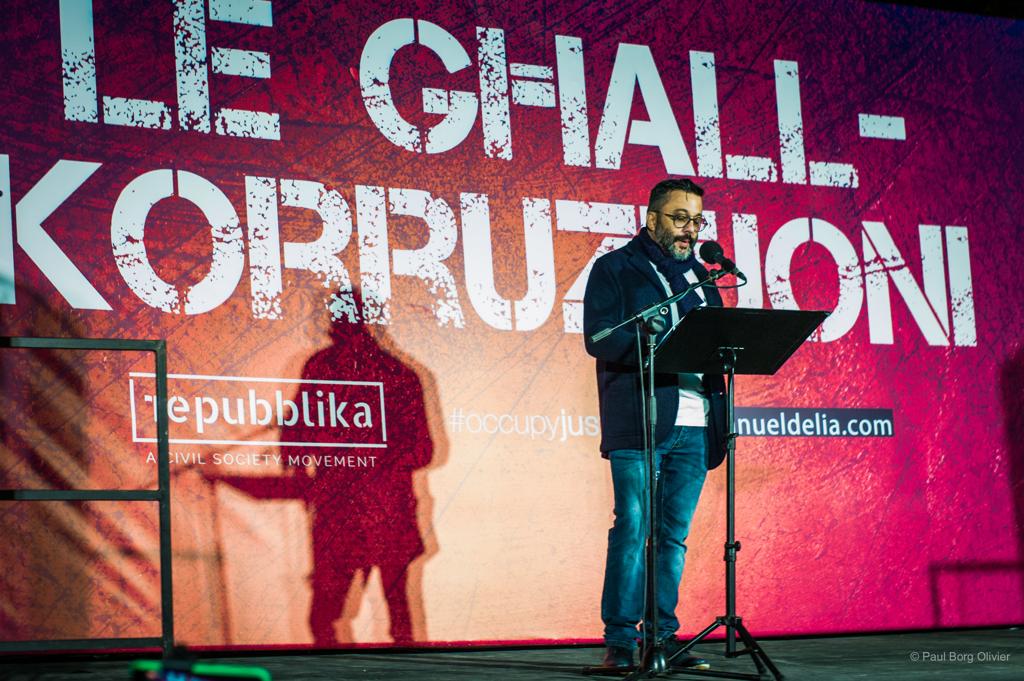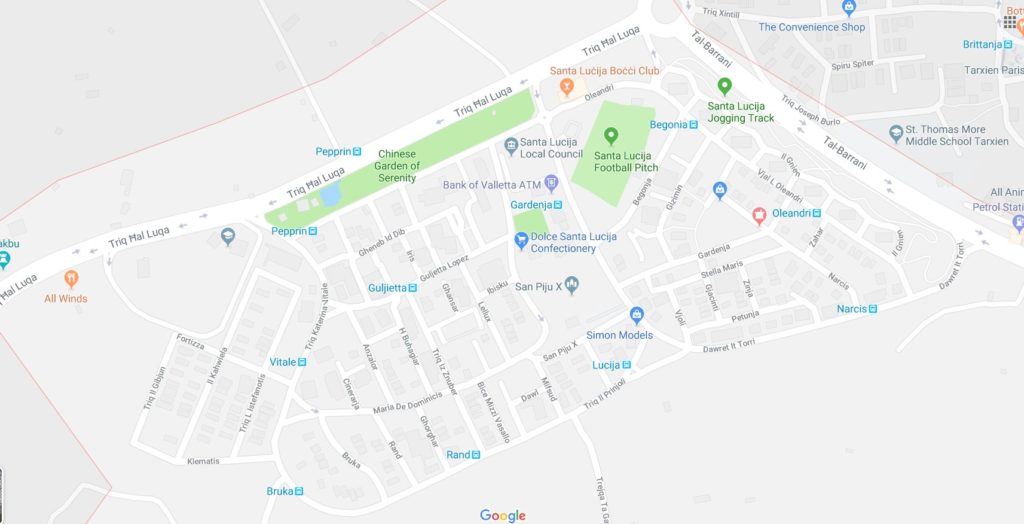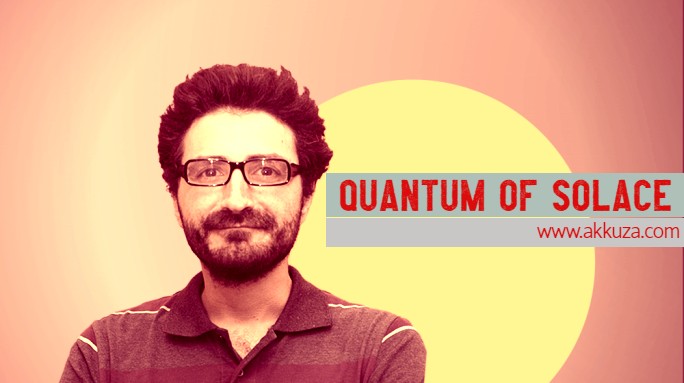Speech delivered at Vigil for Justice for Daphne. 16th November 2019.
First, Let’s Kill All the Lawyers. L-ewwel ma nagħmlu, ejja noqtolu l-avukati kollha. Xi ħsieb dak eh? Ħsieb li jxewwex il-massa. Huwa ħsieb li jmiss xi ħaġa fil-fond ta’ kull wieħed u waħda minnkom, anki jekk forsi ma tkunux lesti tammettu. X’qed ngħid? Probabbli daż-żmien ħadd ma jiddejjaq jgħidu. Daphne Caruana Galizia wkoll forsi kellha xi ħsibijiet koroh dwar l-avukati f’xi mument… imbagħad iżżewġet wieħed… mur obsor …
L-ewwel ma nagħmlu, ejja noqtolu l-avukati kollha. Dik il-frażi taslilna dritt minn triloġija ta- drammi ta’ Shakespeare dwar l-ġlieda għall-poter fi żminijiet diffiċli ħafna fir-renju tal-Ingilterra – qisu Brexit imma fil-passat. Il-mument li fih titlissen dik il-frażi jiġi hekk kif persunaġġ li jismu Jack Cade qiegħed ixewwex folla ta’ nies komuni kontra min qiegħed fil-poter. Mument populista.
Cade qed iwiegħed ikel irħas u birra irħas. Ikompli jwiegħed li ’l quddiem ma jkunx hemm bżonn flus, kulħadd jiekol u jixrob kif irid u kulħadd jilbes tajjeb. Lanqas jilħaq jispiċċa jwiegħed dan kollu li mill-folla ma tqumx l-għajta : “L-ewwel ma nagħmlu, ejja noqtlu l-avukati kollha.”
Shakespeare kien jaf li b’dan il-vers kienu se jogħxew ħafna nies.U hekk hu. Is-sentiment li jesprimi ma huwiex sempliċement wieħed kontra l-avukati iżda kontra l-istruttura legali sħiħa illi fuqha tiddependi u topera s-soċjetà sħiħa. Il-poplu ribelluż, imxewwex minn dak li jixtieq isir Re bil-wegħda ta’ status aħjar ma jirrifjutax il-possibbiltà li jinjora obbligi, li jivvjola wegħdiet u li jikser ir-regoli.
Cade jirkeb id-dagħdigħa tal-mument u jsejjaħ lill-massa biex tkisser l-iskejjel tal-liġi u l-qrati. Minn issa ‘l quddiem il-liġijiet isiru kollha minnu u minnu biss. Cade huwa l-eroj tal-mument. Is-segwaċi tiegħu lesti jaċċettaw sistema li trendi r-rappreżentanza istituzzjonali inutli – lesti jkissru sistema sħiħa. Kollha kemm huma jafu li Cade huwa giddieb magħruf imma lesti jagħzlu l-ħolma-wiegħda tiegħu fuq kollox: “Henceforward all things shall be in common.” L-Ingilterra Tagħna Lkoll.
Cade jgħid lill-marmalja ta’ quddiemu li l-għadu huma l-litterati u l-għorriefa. Ma jdumux ma jixxewxu biex jgħallqu skriba “bil-pinna u l-klamar m’għonqu”. It-tradituri tal-kawża kollha għandhom jinġabu quddiem il-ġustizzja tal-marmalja.
Nista’ nkompli b’iktar eżempji minn dal-kapulavur storiku. Li rridu nifhmu hu li Shakespeare, li kien qed jikteb fi żmien meta stejjer dwar ribelljoni kienu ċċensurati bil-kbir, qed jikxef l-elementi taż-żelqa lejn it-tirannija.
Shakespeare qed iwissi dwar dawn is-sejħiet biex jitfarrku l-ġustizzja u l-għarfien. Twissija li tapplika ghal dawn iż-żmienijiet ukoll. Qiegħdin hawn għal darb’oħra fuq kollox sabiex infakkru kittieba, ħaddiema tal-kelma li sfat suġġett ta’ ordni moqżież : mhux li titgħallaq bil-pinna u l-klamar ma għonqha imma biex iġġarraf splużjoni b’mod barbariku.
Dik l-ordni ġiet fi żmien meta l-battalja kontra l-ġustizzja, kontra l-loġika u kontra r-raġuni kienet ġa bdiet. M’hemm l-ebda dubju – Daphne Caruana Galizia hija l-vittma tax-xewwiexa li qarrqu bin-nies bl-illużjoni ta’ ħajja aħjar, li wasslu biex inkonxjament jiġi injorat it-tkissir tas-sistema, li biegħu il-gidba li dan huwa L-Aqwa Żmien.
Is-sinjali ta’ twissija kienu ilhom hemm. Imma spjegazzjonijiet tekniċi dwar it-tkissir tas-Saltna tad-Dritt – ma jistgħu xejn kontra mewġa fuq mewġa ta’ populiżmu u demagoġija.
Xogħol Daphne kien jifforma parti minn makkinarju ikbar ta’ xogħol impekkabbli magħmul minn mewġa ġdida ta’ ġurnalisti u investigaturi – moviment ġdid kontra l-korruzzjoni fid-dinja, fl-Ewropa u f’pajjiżna.
L-istituzzjonijiet tagħna nħatfu. In-nies għadhom f’qagħda lluppjata ta’ aċċettazzjoni. Għadha ma nqalbitx il-folja. L-isfida li niffaċċjaw illum huwa li nkomplu nipperseveraw u nseddqu l-veritajiet li nies bħal Daphne kienu qalbiena biżżejjed li jikxfu. Hekk kif iktar nies jifhmu bil-qerq il-kbir li tagħha huma l-vittmi, iktar ma tikber ir-rabja għall-bidla.
Sentejn wara l-fatt, irridu naċċettaw ir-realtà patetika li dan l-assassinju ma kienx atroċità kbira biżżejjed li ssarraf f’azzjoni konkreta reali mill-poplu. Irridu naċċettaw il-verità qarsa li anki jekk rajna l-istituzzjonijiet jinħatfu wieħed wieħed, anki jekk rajna ir-rappreżentanza titmermer u titniġġeż mill-kilba partiġġjana, anki jekk rajna lill-għassiesa tagħna nnewtralizzati, dan kollu għadu ma kienx biżżejjed biex ikebbes nar ta’ moviment ta’ bidla.
L-irjus koroh tad-dubju u tan-nuqqas ta’ fidi fil-proxxmu jqumu kull meta forsi kien hemm ħjiel ta’ bidu ta’ bidla. Dak l-istess dubju u nuqqas ta’ fidi jkissru u jifframmentaw l-ilħna tal-bidla u jsaħħu lill-użurpaturi tal-poter.
Imma. Nixtieq inwassal aħbar tajba lil din il-velja. Nixtieq ngħid li l-movimenti taċ-ċittadini mgħaddba għall-istupru tal-ambjent u għall-abbuż tal-awtoritajiet tal-ippjanar, li il-kuxjenza dejjem tikber dwar differenzi kbar soċjal-ekonomiċi – huma sinjal li r-riħ qed iqum.
Nixtieq nenfasizza li minkejja li għad hawn politikanti lesti jixorbu mill-ilma mdardar tar-razziżmu, xenophobija u mibgħeda għall-barrani – hawn ukoll min lest jieqfilhom. Irrid nenfasizza dawn l-aspirazzjonijiet ġodda għal Malta verament Ewropea li taspira tkun parti mill-bidla kontinentali għal futur aħjar.
Dan kollu minkejja – u mhux grazzi għal – ħafna minn dawk li suppost jirrapreżentawna. In-nies qed tfittex vuċi ġdida, bidu ġdid li jwarrab stili qodma u li jwassal proġett ġdid għall-ġid komuni taċ-ċittadini. Il-mara li xogħlha nikkomemoraw illum ħadmet ħafna biex tikxef il-veritajiet li huma neċessarji f’din il-ġlieda. Tagħha ma kenitx qlubija fiergħa. Kif qal Peter, ir-raġel tagħha:
« Il-Qlubija waħedha ftit għandha valur jekk ma għandhiex skop. Mingħajr sens ta’ ġustizzja. »
Illum niltaqgħu biex naqtgħu ras il-mostri tad-dubju u nuqqas ta’ fidi. Niltaqgħu hawn biex inkebbsu dak is-sens ta’ skop. Niltaqgħu hawn biex nikkonfermaw li nemmnu f’socjetà ġusta. Niltaqgħu hawn biex nikkommettu ruħna għat-tfittxija tal-verità, għall-ġlieda għall-ġustizzja u għat-twelid mill-ġdid ta’ Repubblika li rat wisq uġiegħ u ġarrbet wisq dannu.
First, let’s bring them all to justice. L-ewwel ma nagħmlu, ejja naraw li jsir il-ħaqq.








